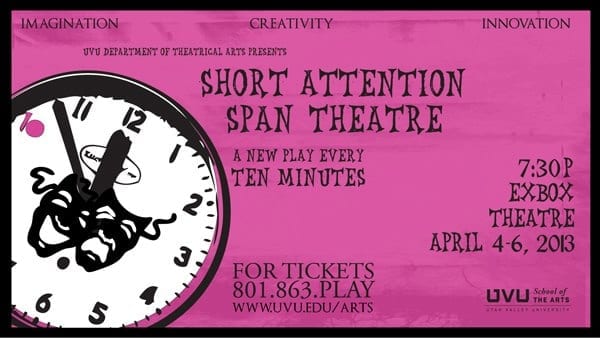OREM — “A new play every ten minutes.” That’s the promise of Utah Valley University’s Short Attention Span Theatre, an evening of short plays playing in the Exbox Theatre this week only. The promise of a different story every 600 seconds is fulfilled, although I found that my satisfaction of the evening often changed as frequently as the program did.
Writers Workshop, written by Stefan Oberlander
The evening started off with what I believe is the weakest of the plays. A playwright gets two friends and his former professor together to read a new script he has written. Soon the actors realize that the story sounds very familiar. The play started out with clunky exposition, including the always-clumsy technique of one character reminding another of what the latter already knows. (i.e., “You know that . . .”) Oberlander’s script also suffered characters who did not act like normal people would in that situation. I didn’t understand, for example, why the actors in the play would stay around and keep reading a script that they knew was about them; the only purpose sticking around would serve would be to humiliate them.
Moreover, Coral Chambers‘s directing is without focus. I didn’t understand why she had the characters read the play within the play in such extreme acting styles (very wooden, excessively melodramatic, etc.). Chambers also had her actors wonder aimlessly around the stage, and many actors didn’t make eye contact with their fellow castmates that they were talking to. I suppose that the delivery could be a performance problem, but I have seen one of the cast members (William Kalmar, who played Philbin) in several other productions, and I know that at least he can produce a university-quality performance. Writers Workshop felt, however, like a high school show.
One and Two, written by Luci MacNair
MacNair’s script has the least traditional structure of the eight plays of the evening. It features people’s reminiscences of a traumatic event, the nature of which is gradually unveiled to the audience. The method of delivery is not terribly original, but it is effective. I found myself curious about the event, and interested in how the characters reacted to it. Director Shawn Saunders effectively created stage pictures as the mood of the script grew more intense, and I like how crisp the cast of six actors executed Saunders’s blocking. The ending especially makes this play the most poignant of the evening. It’s not often that a play preaches a message while simultaneously practicing it.
Duct Up, written by Chelsea “Chex” Frandsen
Two co-workers who have been fired from their jobs break into their former place of employment by infiltrating the building’s air conditioning ducts. I feel like this script suffers from a lack of the most basic ingredients needed in a story: a beginning, a middle, and an end. Instead, Duct Up feels like a premise that has been stretched to 10 minutes. The conflict in the plot feels very contrived, and (like Writers Workshop) has a character who chooses to remain in an unpleasant situation for no apparent reason.
Although the flaws of Duct Up are obvious, it still served as a nice vehicle for Brian Kocherhans (as Justin) and Briana Lindsay (as Cody). Thanks to the talents of both performers and the work of director Jordan Hall, the characters are some of the best defined of the evening. Both performers delivered their lines in believable ways, which helped me feel better about this play than some of the others in the evening. Kocherhans and Lindsay did their best to create a nice tension between their characters; unfortunately the conflict in the story was too trivial and diffuse to let them display the full extent of their talents.
Trial of Artemisia, written by Megan Flox-Lambert
Based on the real-life trial of Artemisia Gentileschi, a renown female Renaissance painter who was a rape victim that was placed on trial for the act because of the sexist and convoluted laws of the time, Trial of Artemisia has the potential to pack a powerful punch. Yet, it falls short. I think that the 10-minute limit is just too constraining for the courtroom drama format, and I often felt like the actors (especially Adam Hutchinson as the judge) were rushing through their lines as quickly as possible in order to not let the play go over time. The result is a dilemma that is resolved almost as quickly as it is set up. There are some nice moments from Maddy Forsyth (as the besieged Artemisia) and Alexander Woods (as Agostino) that director Ashley Ramsey effective fosters, but because of the rushed pacing, the story feels less like a historical drama than a caricature of antiquated legal practices and customs.
Pantheon, written by Jordan Cummings
Pantheon was one of my least favorite performances in Short Attention Span Theatre. Zeus and Yahweh meet to discuss a crisis in their family after their sister Allah has harmed herself. Cummings’s premise in this play is that the many deities worshiped by human civilization are all members of a large family of gods who (much like ancient Greek or Roman gods) have human failings and problems. It’s a nice premise, but Cummings never develops it beyond that—a premise. The script has a couple of nice lines in it that are a natural outgrowth of this central idea, but nothing that is fully developed as a story worth telling. Add in some potentially offensive Jewish stereotypes and telegraphic dialogue, and Pantheon becomes almost too much to bear.
Another problem with Pantheon is the directing from Coral Chambers. Just like Writers Workshop, the directing in Pantheon is full of characters who don’t act in any natural way. There is lots of affected posing, melodramatic actions, and expansive acting (the latter of which doesn’t work well for a domestic drama in the intimate setting of a black box theater). Overall, Pantheon taught me that sometimes even 10 minutes can be too long for a play.
Rocket Man, written by Scott Olsen
Olsen’s script provides a great showcase for Clarissa Lavon Knotts’s portrayal as a woman who recently lost her husband to a space travel accident. The story seems to take place in the not-too-distant future, but some of the details seem contradictory, such as cheap interplanetary travel that still seems to be unusual for everyday people. Nevertheless, I like a good science fiction story, and it’s a genre that I believe is not explored sufficiently on stage. Like all good science fiction, Rocket Man, is really about a human experience, in this case how to deal with sudden loss—a theme that director Heather Ashton seemed eager to explore.
I felt like Rocket Man, though was too quiet and subtle to take on a life of its own in just 10 minutes. Rather, it felt like the last scene of a independent film. I don’t mean this as an insult; instead, I think that the story would work better in a different genre (just like Trial of Artemisia).
One, written by Alex Barlow
One was the most successful play of the evening. In this play a loner receives two visitors in one night with shocking results. Barlow’s script was a example of what every beginning playwright needs to have in a story: well defined characters with clear wants, conflicting goals among characters, and the classic Aristotelean structure (i.e., exposition, rising action, climax, denouement). Moreover, this horror story fit into the short play genre better than any of the other plays in Short Attention Span Theatre.
A wonderful strength of One is Barlow’s direction, which carefully introduces the three characters one at a time. Barlow also created genuinely creepy stage pictures that are almost certainly the most endearing images of the night. And I appreciated Josh Brown’s performance as the somewhat elderly loner Roger. Brown’s character was accessible in the first few minutes of the play, which made his later actions appropriately disturbing. Samantha Pace (as the Spectre) and Briana Lindsay (as the girl) had much smaller parts, but appropriately played off Brown’s character’s insecurities (which led to devastating results). I hope that Barlow keeps the script of One handy for the Halloween season.
May He Rest in Peace, written by Megan Flox-Lambert
The final play of the evening, May He Rest in Peace, is also the one that I wish most to see as a full-length play. Two feuding elderly women, Helen (played by Clarissa Lavon Knotts) and Mrs. Snable (played by Briana Lindsay) feud over a necklace that is to be buried with Helen’s brother, who also was Mrs. Snable’s lover. The rivalry between Helen and Mrs. Snable was a hoot to watch, and the combination of the witty dialogue and the terrific physicality of the two women (especially Knotts, who plays a convincing senior citizen without the aid of makeup or a frumpy costume) made this play the funniest of the night Flox-Lambert has created lovable characters that clearly have decades of trying to best one another. I enjoyed imaging other encounters they had in the past, which is why I think this play would work well if lengthened. I strongly urge Flox-Lambert to expand this script so that others may learn these two hilarious characters’ histories and the root of their enmity towards one another. Director Brooke Grant was superb also at establishing the tone of the play quickly and moving the story along naturally, despite the absurdity of the action.
My overall impression of Short Attention Span Theatre is that it is uneven, but that doesn’t concern be terribly. As I have stated before, creative staff on university productions sometimes have academic goals that other theatre artists don’t share. Short Attention Span Theatre is a great venue for developing stories, skills, and talent that Utah Valley University can later use in other productions. Some of these scripts will probably languish and die, but, in a sort of artistic evolution, the fittest will survive and flourish. Short Attention Span Theatre as a whole won’t rank among my favorite theatrical events of the year, but there are some jewels—especially the final two plays—that are quite commendable.







